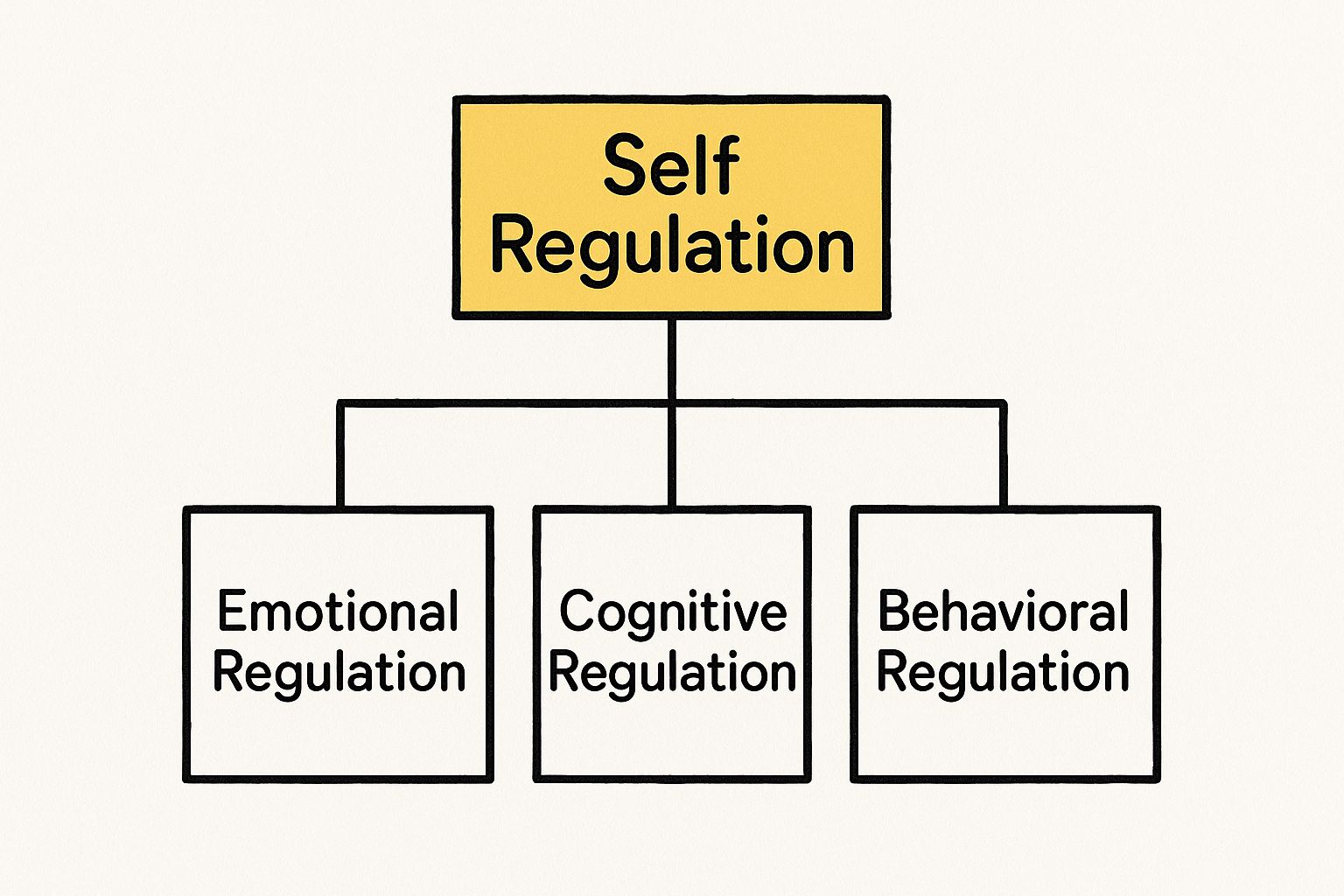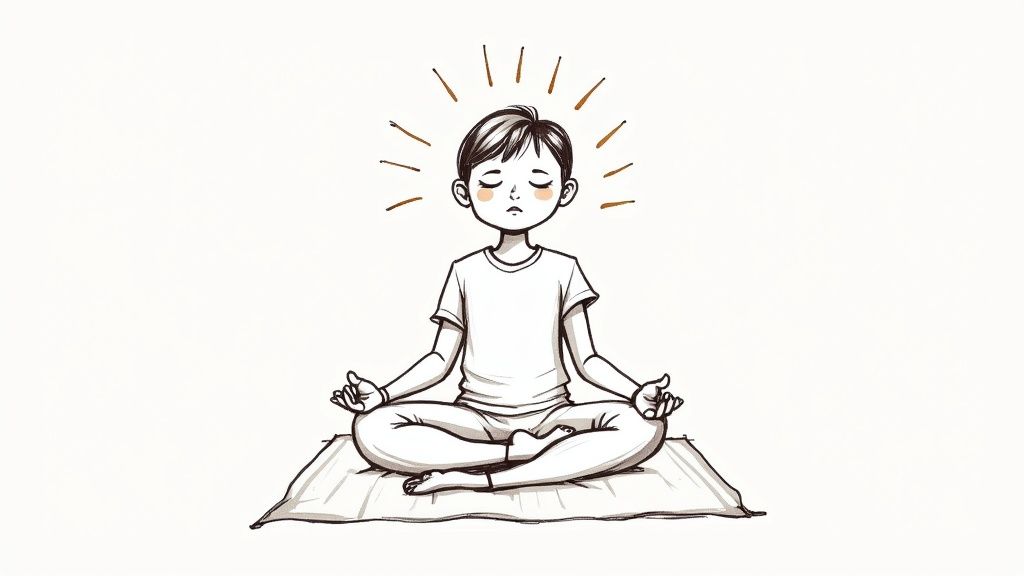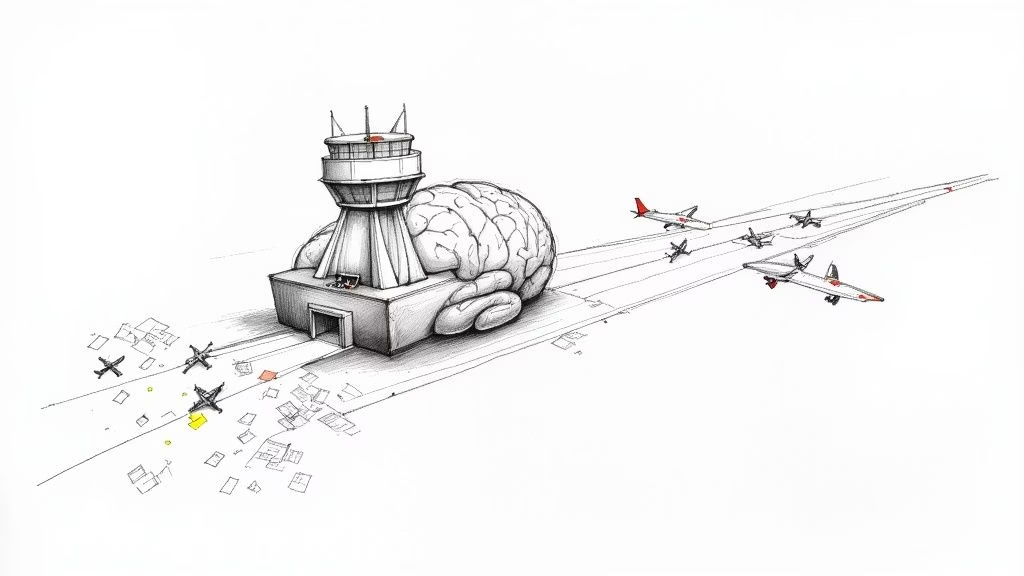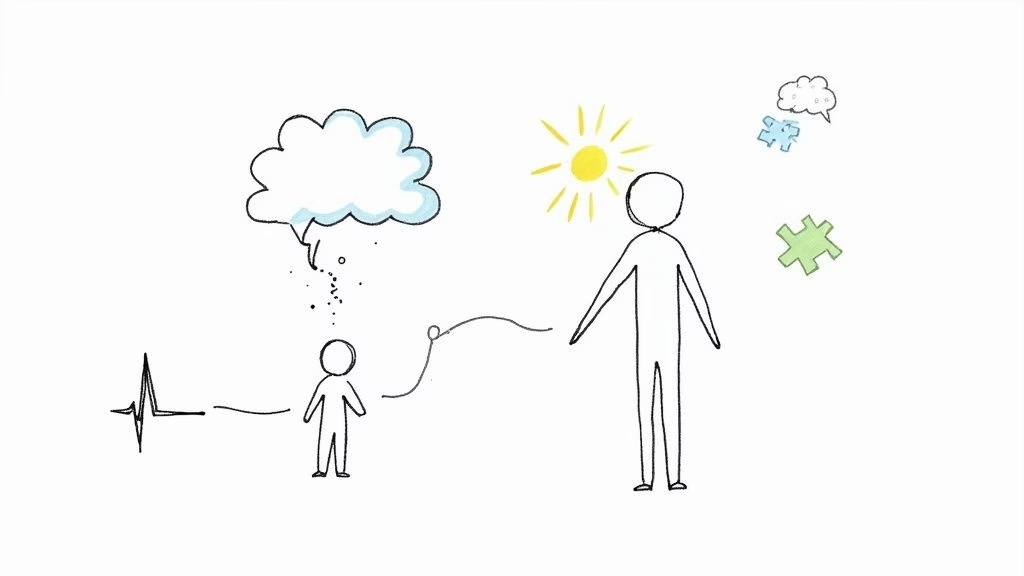Self-regulation is your ability to manage your thoughts, feelings, and actions to get where you want to go. It’s that little pause you take before you react. It’s the force that keeps you locked in on homework when your phone is buzzing. It's what helps you ride the wave of a big emotion without getting pulled under.
Think of it as your brain’s internal CEO—the part of you that makes smart, strategic decisions instead of just going with the flow.
Your Brain's Command Center
Imagine a thermostat in your house. When it gets too hot or too cold, the thermostat kicks in to get things back to a comfortable, stable temperature. Self-regulation does the exact same thing for your mind and body. It’s your internal regulator, helping you stay balanced when life gets stressful or chaotic.
This isn’t about bottling up your emotions or being a robot. Just the opposite. It’s a flexible, powerful skill that helps you navigate life’s ups and downs with more control and confidence.
This crucial skill is built on three core pillars that all work together. This infographic breaks down what that looks like.

As you can see, self-regulation isn't just one thing. It’s a combination of emotional, cognitive, and behavioral management, and each one plays a huge role in how you show up in the world.
The Three Pillars Explained
Getting a handle on these three pillars is the first step to building them up. Each one governs a different part of your internal world and your external actions, and they're all connected.
Let's break down what each pillar really means with some real-life examples for teens.
The Three Pillars of Self Regulation
| Type of Regulation | What It Means | Teen Example |
|---|---|---|
| Emotional Regulation | Your ability to manage feelings without letting them take over. | You get a bad grade on a test you studied for. Instead of blowing up, you take a few deep breaths to calm down before deciding what to do next. |
| Cognitive Regulation | Your ability to manage your thoughts and attention. | You have a huge project due. You decide to turn off your phone notifications and focus for 45 minutes straight before taking a break. |
| Behavioral Regulation | Your ability to control your actions and impulses. | Your friends are all going out, but you promised you'd finish your chores. You stick to your commitment instead of bailing. |
These skills aren’t just abstract ideas; they're the practical tools you use every single day to make progress.
These pillars are also deeply tied to your brain's "executive functions," which are the high-level mental processes that help you plan, focus, remember instructions, and juggle multiple tasks. Think of them as the behind-the-scenes crew that makes self-regulation possible. Mastering cognitive regulation, for instance, is all about finding strategies to focus better and reclaim your attention so you can direct your mental energy where it matters most.
Self-regulation is more than just a personal skill—it has a massive impact on your life. Research has linked strong self-regulation to a significant reduction in everything from violence to substance use. It's also tied to better mental health and even long-term financial success. It’s not an exaggeration to say that this is one of the most important skills you can build for your future.
The Connection Between Procrastination, Motivation, and School

Putting off that big history paper isn't just about laziness—far from it. More often than not, procrastination is a self-regulation challenge in disguise. The pull to delay tasks is tied directly to your ability to manage big feelings like anxiety or boredom and stay focused on your schoolwork, which are the cornerstones of self-regulation.
When a project feels huge or you’re worried about not doing it perfectly, your emotional regulation system goes into overdrive. For many teens, the quickest way to dial down that stress is to just… not do the thing. This isn't a character flaw; it's a coping mechanism. The real trouble is that this avoidance creates a vicious cycle of stress that kills motivation and only gets worse as the deadline gets closer.
Why Your Brain Chooses Procrastination
At its core, procrastination is usually an emotional issue, not a time-management one. Your brain is hardwired to dodge threats. For a teen juggling school pressures, a tough assignment can feel like a real threat to your confidence and self-worth. It turns into a battle between what you want long-term (a good grade and less stress) and what you want right now (to feel less anxious).
This is also where cognitive regulation comes in. If you struggle to tune out the constant buzz of your phone or social media, sticking with a hard task can feel next to impossible. Building strong self-regulation skills is what flips the script, giving you the power to manage your focus and find your motivation for school.
Actionable Strategies to Build Momentum
The good news is that you can learn how to stop procrastinating. It just takes some practical, consistent effort to break down the emotional and mental walls holding you back. The goal is to make tasks feel less intimidating and way more manageable.
Try starting with these strategies:
- The 5-Minute Rule: Just commit to working on something for five minutes. That’s it. Getting started is always the hardest part, and this tiny commitment is often all it takes to build momentum.
- Break It Down: A massive project is terrifying. Tiny steps aren't. Instead of "write research paper," make your first step "find three good sources." Suddenly, it feels doable.
- Time Blocking: Carve out specific, scheduled blocks of time for your schoolwork and treat them like appointments you can't miss. This adds structure and cuts down on the mental energy wasted deciding when to work.
A huge part of mastering this is learning how to overcome self-sabotage when you feel yourself slipping into old habits.
Recognizing that procrastination is a skill deficit—not a moral failing—is the first step. By focusing on building your regulation "muscles," you can regain control over your motivation and academic life.
A Simple Meditation Guide for Teens

Meditation is a workout for your brain's self-regulation muscles, but it doesn't have to be some mysterious, complicated thing. Honestly, it’s just hitting the pause button on life’s chaos.
Think of it as a tool that lets you observe your thoughts and feelings without having to immediately react to them. It’s not about emptying your mind—that’s impossible. It’s about paying attention to right now, on purpose.
The science is solid: even a few simple breathing exercises can calm your nervous system, sharpen your focus, and put you back in the driver’s seat.
Your 5-Minute Meditation Exercise
You can do this anywhere. In your room, on the bus, or right before a big test. It’s a quick reset that strengthens your self-regulation.
- Find a Comfortable Spot: Sit upright but relaxed. Feet flat on the floor, hands resting in your lap. No need to pretzel yourself into a yoga pose.
- Close Your Eyes (or Don't): You can gently close your eyes or just lower your gaze and find a spot on the floor to look at. Whatever feels right.
- Focus on Your Breath: Just notice your breath. Feel it coming in and going out. Don't try to change it, just observe it.
- Notice Wandering Thoughts: Your mind will wander. That’s what minds do. When you notice it drifting to school, friends, or what's for dinner, just gently guide your attention back to your breath. No judgment.
- Practice for 5 Minutes: Set a timer. Every single time you bring your focus back to your breath, you’re doing one more rep for your attention muscle. That’s the whole workout.
Overcoming Common Hurdles
Starting a meditation practice can feel awkward. It's totally normal, especially when your mind feels like it has a million tabs open. Most teens hit the same roadblocks, but they’re easy to get past.
"I can't stop thinking!" is the most common thing I hear. The goal isn't to stop thinking—it's to notice that you're thinking and gently come back to your breath. Every time you do that, you're building a powerful self-regulation skill.
If it feels boring, try focusing on other things. What do your feet feel like on the ground? What sounds can you hear around you? The key is just short, consistent practice.
For a deeper dive, exploring a guide on meditation for teens can give you more techniques and help you build a routine that actually works for you. Just remember, this is a skill. And like any skill, it gets stronger the more you practice.
Practical Parenting Tips to Nurture Self-Regulation

Helping your teen build self-regulation isn't about enforcing rules—it's about connection and coaching. As a parent, you have this incredible opportunity to model what emotional balance looks like and guide them through challenges with empathy, not control. It’s an approach that builds skills for life.
When you handle your own stress with a bit of calm and patience, you're literally showing them the way. This is something we call co-regulation. Think of it as lending them your calm, helping them ride out intense feelings without judgment until they learn to find their own balance.
Let's say they're completely overwhelmed by a huge school project and have shut down. Instead of criticizing the procrastination, try sitting down with them. Break the massive task into smaller, less intimidating steps. This doesn't just teach planning; it shows them that big challenges can be met with strategy instead of avoidance.
Fostering Communication and Responsibility
Honestly, just talking about feelings is a game-changer. When your home is a safe place to admit to feeling anxious or frustrated without being shut down, you're building a foundation for good mental health.
Setting clear boundaries also does wonders. It’s not about rebellion; it's about responsibility. When you create expectations and consequences together, you give them a sense of ownership. They start to connect their actions to the outcomes, which is a massive part of self-regulation.
Here are a few parenting tips you can try:
- Model Your Own Process: When you get frustrated, narrate it. Say something like, "I'm feeling really stressed about this, so I'm going to take a few deep breaths before I figure out what to do next."
- Collaborate on Solutions: If they're dreading a big exam, work on a study plan with them. This turns a power struggle into a partnership and teaches vital planning skills.
- Use Reflective Listening: When they vent about a fight with a friend, just listen and repeat back what you hear. "Wow, it sounds like you felt really hurt when they said that." It validates their feelings and helps them pinpoint what triggered them.
- Encourage Problem-Solving, Not Rescuing: If they forget their homework, resist the urge to drive it to school for them. Let them experience the natural consequences. This helps build responsibility and foresight.
Research consistently shows that self-regulation skills require continued support well into late adolescence. Recognizing that these abilities are still developing allows you to meet your teen where they are, providing the scaffolded support they need to succeed.
For teen boys, who are often taught to bottle things up, finding the right support is everything. Men's groups like Evryman create spaces where young men can learn to express themselves in healthy ways. Connecting them with resources designed for their unique challenges can make all the difference in their emotional growth.
Mental Health Resources for Struggling Teen Boys and Young Men
Let's be honest: being a teenage guy isn't always easy. There's a ton of pressure to have it all figured out, and society often sends a mixed message that asking for help is a sign of weakness.
But the truth is, learning to manage your own thoughts and emotions—building self-regulation—is one of the most powerful signs of strength you can show. It’s not about being weak; it’s about being smart and proactive about your own well-being, especially if you're struggling.
Feeling stuck, overwhelmed, or just unmotivated is incredibly common. You’re not the only one, and you definitely don’t have to figure it out on your own. Thankfully, there are more resources designed specifically for young men today than ever before. These are places that get it. They understand the challenges you're up against and provide a space to build skills, connect with others, and learn to handle life’s curveballs.
Where to Find Support
Finding the right community or professional can be a game-changer. The goal is to find a space where you don't have to pretend—a place where you feel understood and can work on what’s really going on inside.
Here are a few great places to start looking:
- Men's Groups: Organizations like Evryman are all about creating communities where guys can talk openly without judgment. They focus on building what they call "emotional fitness," offering peer support that makes a massive difference in learning self-regulation.
- Mental Health Platforms for Teens: Websites and apps like Teen Counseling and The Jed Foundation are built for you. They offer confidential support, helpful articles, and direct access to professionals who specialize in everything from school stress to more serious mental health concerns.
- Podcasts and Media: Sometimes, just hearing someone else’s story is enough to feel less alone. There are tons of podcasts out there focused on men's mental health, tackling topics like anxiety, motivation, and building healthy relationships in a way that’s actually relatable.
To give you a clearer picture, here’s a breakdown of some top-notch resources available right now.
Support Resources for Young Men
These organizations and platforms offer a safe space for teen boys and young men to find community, learn emotional skills, and get the mental health support they need.
| Resource Name | Focus Area | How It Helps |
|---|---|---|
| The Jed Foundation (JED) | Suicide Prevention & Mental Health | Provides teens with skills and support to navigate emotional challenges, along with resources for schools and families. |
| Evryman | Emotional Fitness & Community | Offers online and in-person groups where men can connect, talk honestly, and build emotional resilience with their peers. |
| Teen Counseling | Online Therapy for Teens | Connects teenagers (13-19) with licensed therapists for confidential and convenient support via messaging, chat, and video. |
| HeadsUpGuys | Depression in Men | A resource focused specifically on fighting depression in men, offering practical tips, success stories, and self-check tools. |
| Man Therapy | Men's Mental Health | Uses humor and a relatable approach to break the stigma, providing resources and a "head-inspection" tool for mental wellness. |
Finding the right fit is about discovering what works for you. Whether it's a group, a podcast, or a professional, the important thing is taking that first step.
Remember, seeking support isn't about "fixing" something that's broken. It's about adding powerful tools to your toolkit. Learning to manage your inner world is one of the most important skills you can develop for success in school, relationships, and your future career.
It can feel a little intimidating at first, but reaching out is a direct path to building the resilience and self-awareness you need to not just get by, but to truly thrive.
A Few Common Questions
When you're new to the idea of self-regulation, it’s normal to have a few questions. Let's clear up some of the most common ones.
How Is Self-Regulation Different From Self-Control?
This is a great question. While they sound like the same thing, they’re actually two different tools in your mental toolkit.
Think of self-control as hitting the brakes. It’s reactive. It’s that moment you stop yourself from blurting something out in anger or hitting snooze for the tenth time. It’s about stopping an impulse in its tracks.
Self-regulation, on the other hand, is the whole car—the engine, the steering wheel, and the GPS. It’s the entire proactive process of managing your thoughts, feelings, and actions to get where you want to go. It’s not just about not yelling; it's about noticing you're getting angry, using a strategy to calm down, and then choosing a better way to respond. It’s a complete system, not just an emergency brake.
When Should You Start Learning Self-Regulation?
Honestly, the building blocks are laid down from the time we’re born. Babies learn to soothe themselves, and toddlers have to figure out how to wait their turn for a toy. It’s a lifelong process.
But the teenage years? That’s prime time. Your brain is in the middle of a massive upgrade, which makes it the perfect opportunity to intentionally build more advanced skills. You're dealing with more complex emotions, bigger academic pressures, and tricky social situations—all of which require a solid self-regulation system.
Research shows that the cognitive abilities needed for self-regulation, such as planning and delaying gratification, continue to develop well into early adulthood. This means that teens are ideally positioned to benefit from intentional support in building these crucial skills.
Can You Improve Self-Regulation as an Older Teen or Adult?
Absolutely. It’s never too late. Your brain has this amazing ability called neuroplasticity, which just means it can change, adapt, and build new connections at any age.
Every time you practice a self-regulation strategy—like mindfulness, breaking a big project into smaller steps, or just noticing what triggers your stress—you're strengthening those neural pathways. Think of it like a muscle. The more you work it, the stronger it gets. It just takes conscious effort and knowing which exercises to do.
At Andrew Petrillo Life Coaching, we specialize in giving teens and young adults the practical tools they need to master self-regulation and thrive. If you're ready to move from feeling overwhelmed to feeling in control, learn more about our personalized coaching programs at https://andrewpetrillolifecoaching.com.



















